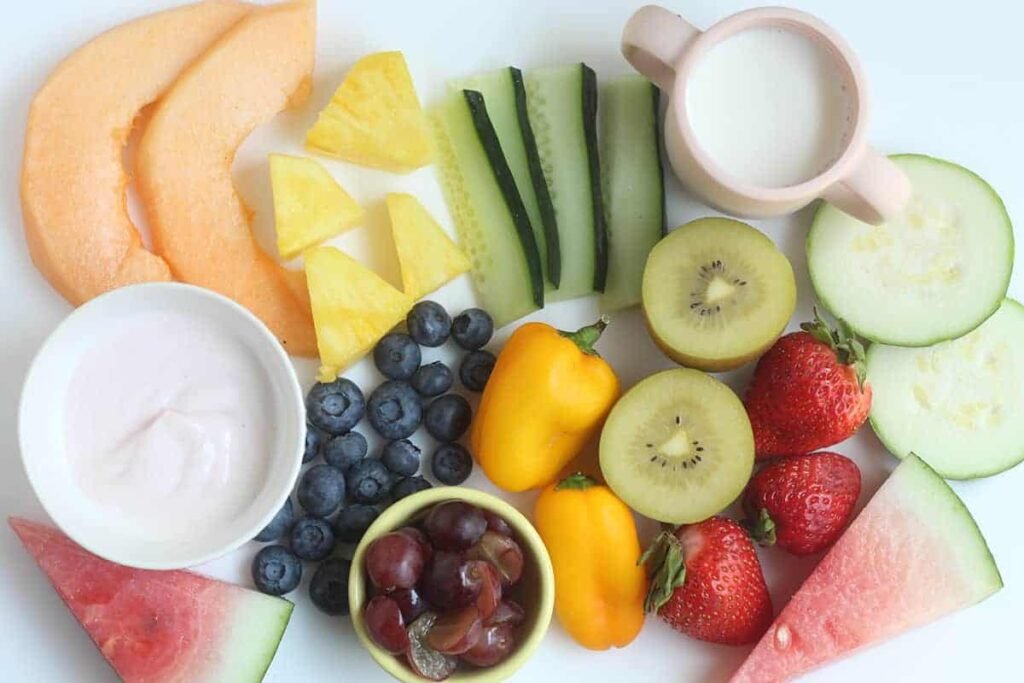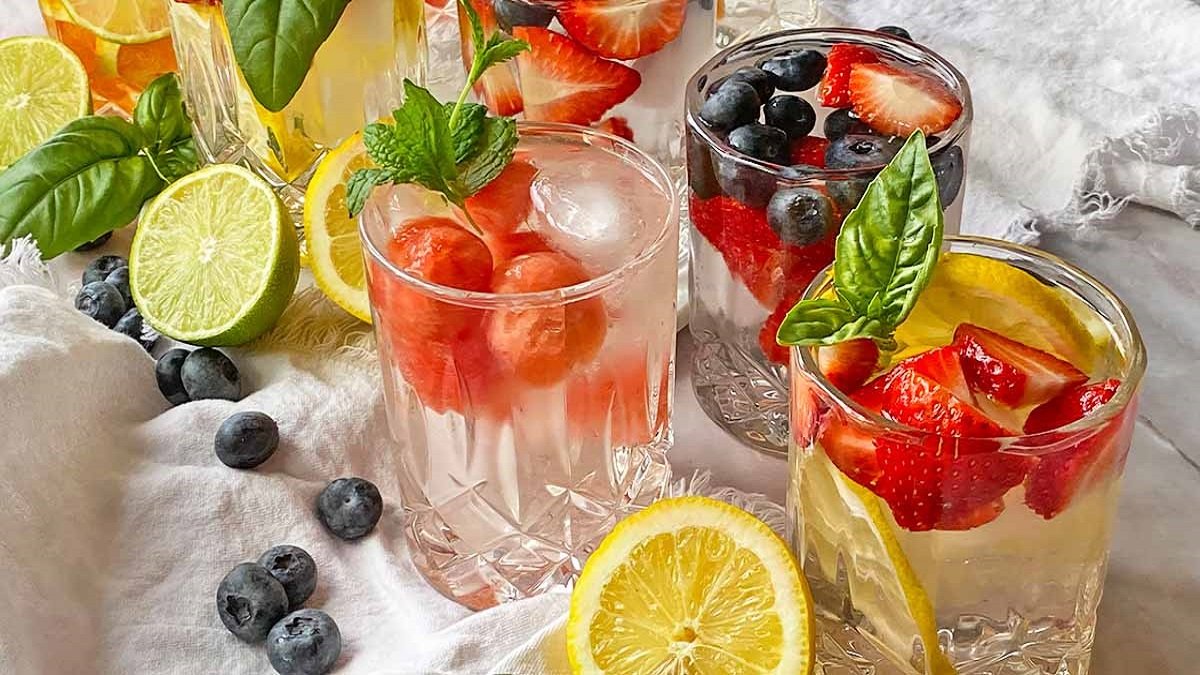Did you know that water makes up around two-thirds of your body? Thus, you must maintain enough hydration. However, you can keep appropriate fluid levels with some foods to eat for hydration.
Another excellent source of water is a variety of fruits and vegetables. In fact, your meals account for around a fifth of your daily fluid consumption. We’ll list some fruits and vegetables that are high in water content that you should consider including in your diet.
Food To Stay Hydrated

1. Cucumber
Cucumbers are incredibly refreshing foods to eat for hydration, containing about 96% water, making them the most water-rich food available. This high water content not only helps maintain hydration but also supports healthy skin, digestion, and overall body function. Beyond their impressive hydration benefits, cucumbers are a low-calorie food packed with essential nutrients.
They provide a modest amount of vitamins, such as vitamin K, vitamin C, and several B vitamins, along with dietary fiber that supports digestion and satiety. Their refreshing crunch and mild flavor make cucumbers a versatile addition to a variety of meals and snacks. For a healthy snack, try dipping cucumber sticks into hummus for a satisfying blend of fiber and protein.
You can also create a naturally flavored detox drink by infusing water with cucumber slices, mint leaves, and a splash of lime juice. Moreover, adding cucumber to salads not only enhances texture and taste but also boosts hydration and nutrition.
2. Tomatoes
Tomatoes are made up of over 95% water, making them an excellent food for staying hydrated. Their high water content contributes to overall hydration while also supporting healthy digestion and skin health. Tomatoes come in many varieties, from small, sweet cherry tomatoes to large, juicy beefsteak tomatoes and flavorful vine-ripened ones, offering options to suit every taste and dish.
In addition to their refreshing juiciness, tomatoes are rich in vitamin A, which plays a crucial role in maintaining the health of your skin, vision, and immune system. They are also a good source of antioxidants, particularly lycopene, which has been linked to reduced inflammation and improved heart health.
Tomatoes are incredibly versatile in the kitchen—add fresh slices to salads and sandwiches, stir them into scrambled eggs for added flavor, or cook them with herbs, olive oil, and garlic to make a simple, delicious homemade pasta sauce. You can also freeze cooked tomatoes for later use.
3. Spinach
This one of the best hydrating foods is composed of about 93% water, making it an excellent food for promoting hydration while providing a wide range of nutrients. Especially in hot weather or following exercise, its high water content helps to preserve fluid balance in the body.
Spinach is also a great source of iron, a vital mineral that supports oxygen transport in the blood and strengthens the immune system. In addition to iron, spinach contains other important nutrients such as vitamin K, vitamin C, folate, and antioxidants that contribute to overall health. Its mild flavor and tender texture make spinach incredibly versatile in meals.
Add a handful to smoothies for a nutrient boost without affecting the taste, or use it as a base for fresh, crunchy summer salads. You can also blend spinach with basil, olive oil, and garlic to create a healthy homemade pesto, freezing portions in ice cube trays for later. Frozen spinach is convenient and ideal for enriching casseroles, soups, and stews.
4. Mushrooms
Mushrooms are made up of approximately 92% water, making them a hydrating and nutritious addition to your diet. In conjunction with their high water content, mushrooms are a rich source of riboflavin, also known as vitamin B2, which plays an essential role in maintaining healthy skin and supporting the nervous system.
Riboflavin also helps the body convert food into energy and can reduce feelings of tiredness and fatigue. Mushrooms are low in calories, fat-free, and contain beneficial plant compounds that support immune function. Their savory, umami flavor makes them a versatile ingredient in many dishes.
For a simple and healthy twist on pizza, top two large Portobello mushrooms with chopped tomatoes and a sprinkle of low-fat cheese, then bake until tender. You can also finely chop mushrooms and add them to casseroles, stews, soups, or chilis to boost flavor and nutrients. They blend seamlessly into Bolognese sauce, offering a hearty, meat-like texture.
5. Brussels Sprouts
Whether you like them or not, Brussels sprouts contain about 86% water, which makes them a hydrating addition to your meals. As a cruciferous vegetable, they are not only rich in water but also packed with essential nutrients. One of their standout nutrients is folic acid, or folate, which is vital for numerous bodily functions.
Folate plays a key role in the production of red blood cells and is especially important during pregnancy for the healthy development of the fetus. This one of the foods to eat for hydration also helps reduce tiredness and fatigue and contributes to the proper functioning of the immune system. Brussels sprouts have a slightly nutty flavor and a firm texture that pairs well with a variety of dishes.
You can enhance the nutritional content and flavor of your stir-fries by adding Brussels sprouts alongside traditional ingredients like peppers, Pak choi, and bean sprouts. Lightly sautéed or roasted, they also make a delicious side dish on their own.
6. Yellow Melon
Yellow melons, such as the sweet and refreshing honeydew variety, are composed of approximately 91% water, making them an ideal fruit for hydration, especially during warmer months. Their high water content helps keep the body cool and hydrated, while their naturally sweet taste healthily satisfies cravings.
In addition to being low in calories and sugar, yellow melons are a great source of potassium—an essential mineral that helps regulate blood pressure, balance fluid levels, and ensure proper muscle and nerve function. Eating potassium-rich foods like melon can contribute to heart health and overall well-being.
Their smooth texture and mild flavor make melons perfect for creative dishes. Try slicing honeydew into triangles and topping them with fresh berries to make a fun and nutritious “melon pizza.” Alternatively, you can mix chunks of melon with other colorful fruits to create refreshing fruit kebabs, perfect for parties, snacks, or healthy desserts.
Read More: 9 Healthy Foods That Lift Your Mood
7. Broccoli
If you’re a fan of broccoli, you’ll be pleased to know that this nutritious vegetable is made up of around 90% water, making it a great option for staying hydrated while enjoying a wealth of health benefits.
Broccoli is packed with essential vitamins and minerals, including iron, which supports oxygen transport in the blood; calcium, important for strong bones and teeth; folic acid, crucial for cell growth and especially important during pregnancy; vitamin K, which aids in blood clotting; and vitamin A, which supports vision, skin, and immune function.
With its high nutrient density and low-calorie content, broccoli is an excellent addition to a balanced diet. For a delicious twist, roast broccoli florets with a drizzle of sesame oil and a sprinkle of flaked almonds for a nutty, crunchy side dish. Alternatively, blend broccoli with sharp cheddar to create a comforting pot of creamy broccoli and cheddar soup—perfect for a warm, nutritious meal.
8. Oranges
About 86% of oranges are made of water. Vitamin C may be found in citrus fruits such as oranges, lemons, clementines, and satsumas. As an antioxidant, vitamin C supports the health of your skin, arteries, muscles, bones, and tendons. This one of the best hydrating foods also aids in the body’s absorption of iron from meals and contributes to the healthy operation of your neurological and immunological systems.
To prepare a tangy carrot, orange, and avocado salad, peel and slice two oranges and three carrots, then combine them with rocket, avocado, and olive oil. Alternatively, use orange segments in a fruit salad and garnish with seeds and yogurt. Remember that one 150 ml glass of orange juice is also considered one of your five a day.
9. Blueberries
Blueberries have surged in popularity in recent years, often hailed as a superfood thanks to their impressive nutritional profile. Composed of over 85% water, blueberries are an excellent way to stay hydrated while also fueling your body with important nutrients. They are rich in dietary fiber, which supports healthy digestion, and packed with essential vitamins and minerals, including vitamin C, vitamin K, and manganese.
One of the standout qualities of blueberries is their high antioxidant content—particularly anthocyanins—which helps protect your cells from oxidative stress and may reduce the risk of chronic diseases such as heart disease and cancer.
Blueberries are incredibly versatile and easy to incorporate into your diet. Toss a handful into your morning smoothie or sprinkle them over cereal or oatmeal for a burst of flavor and nutrition. For a delicious and healthy dessert, enjoy blueberries with creamy yogurt and a topping of chopped nuts and seeds for added texture and nutrients.
Why We Should Stay Hydrated
Staying hydrated is essential for maintaining good health and overall well-being. Water is essential to almost every physical function and makes up over 60% of the human body. From regulating body temperature and supporting digestion to transporting nutrients and removing waste, water is crucial to keeping our systems running smoothly.
One of the most important reasons to stay hydrated is to support brain function. Even mild dehydration can impair concentration, memory, and mood. Drinking enough water helps maintain focus and energy levels throughout the day. Hydration also plays a key role in physical performance. Water largely makes up muscles, and dehydration can cause fatigue, cramps, and decreased endurance.
Proper hydration supports healthy skin by flushing out toxins and keeping skin cells plump and vibrant. It also aids digestion and prevents constipation by helping to move food through the digestive tract. Also, water helps the kidneys filter waste and maintain electrolyte balance.
The amount of water needed can vary depending on age, activity level, and climate, but a general guideline is to drink about eight-ounce glasses per day. Having foods to eat for hydration, such as cucumbers, spinach, and oranges, can also contribute to daily hydration needs.
In summary, staying hydrated is a simple yet powerful way to support your body and mind. Whether through drinking water, herbal teas, or consuming hydrating foods, making hydration a daily priority can lead to better health, improved energy, and enhanced overall function. Make it a habit to drink water consistently—your body will thank you.
FAQ
Q: What is the most effective way to stay hydrated?
A: Plain water is the most effective way to stay hydrated. Although there are various ways to stay hydrated, pure water is the most easily absorbed and has no calories, sugar, or chemicals. Furthermore, fruits and vegetables are great ways to stay hydrated.
Q: Which foods have the highest water content?
A: The largest water content of any food is found in cucumbers, which are composed of around 96% water. They are also a good source of fiber and vitamins and low in calories.
Q: What is the process of hydration?
A: Water is necessary for the normal operation of every cell, tissue, and organ in your body. More precisely, water is used by your body for several vital processes, including the transportation of nutrients, maintenance of a healthy body temperature, waste elimination, and joint lubrication. This implies that being well-hydrated is essential for your general well-being.











